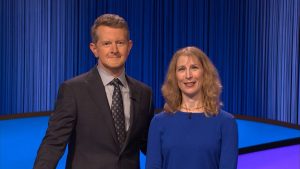
In just a matter of days, Melissa Klapper went from using “Jeopardy!” clues to teach her Women in Modern American History class to competing on the Alex Trebek Stage.
The Jewish Rowan University professor ended a four day “Jeopardy!” run on March 23, racking up a $60,100 winning and gaining status as a three-day champion.
“This is probably the first time ever in my career that any student probably thought that I was cool,” she said.
During her time on “Jeopardy!”, 49-year-old Merion Station resident fielded categories about the Lincoln Highway, American novelists and four-letter verbs starting with “V” — not letting getting beat to the buzzer on a clue about Yom Kippur get to her head.
Klapper, who teaches American history at Rowan and is the coordinator of women’s and gender studies, prepped for her Jeopardy stint, filmed in January, for two weeks. The Sha’arei Orah Congregation and Lechu Neranena partnership minyan member read children’s books on geography and science to learn quick facts. She clicked a ballpoint pen to prepare her buzzer reflexes, though admits to lack of hand-eye coordination was a handicap during her time on the show.
Her career in academics, however, gave her an advantage, Klapper said.
“I’m a teacher; I do a lot of public speaking,” she said. “I don’t have a problem with being up in front of people, and that is an issue for some contestants, that they just don’t do that ever in their real life, and so they get up on stage and freeze.”
With 22 years of teaching at Rowan, Klapper is well-versed in her field. She’s published four books, including “Ballots, Babies, and Banners of Peace: American Jewish Women’s Activism, 1890-1940,” which won the National Jewish Book Award in 2013, and most recently, “Ballet Class: An American History.”
But Klapper’s “Jeopardy!” journey started in her childhood homes in Dallas and Baltimore where she and her family would play the “Jeopardy!” board game. Klapper developed a love of trivia, auditioning for the teen tournament in high school, and later joining the contestant pool for the adult tournament after taking the online test. It would take a second online test 18 months after her first effort to be invited to Los Angeles to compete on the show.
Klapper’s Jewish family had a love of learning, and her teacher mother instilled in her and her sister a love for reading.
“Sometimes after Shabbat dinner on Friday night….there would be just the four of us sitting around in dead silence, only pages turning,” she said.
As an adult, Klapper’s reading list topics range from the history of the Academy Awards to ballet memoirs to young adult fantasy.
“It’s important to be curious about the world and to understand that most people have different experiences from each other,” Klapper said. “And so learning about that adds to a person’s sense of empathy and the ability to imagine lives other than the ones that they’re living.”
While her breadth of knowledge gave Klapper the edge on “Jeopardy!”, the depth of her scholarship is what has given her recognition from the American Jewish Archives and the Hadassah-Brandeis Institute, among others. Klapper focuses on the stories not told in many history books, with a focus on American Jewish women.
“I noticed, from two directions, that Jewish history often did not talk much about women,” she said. “And that general American women’s history narratives — not just American, but general women’s history narratives — didn’t have much to say about Jewish people.”
There’s a balance that Klapper has to keep in her scholarship. As an American Jewish woman, she feels a closeness to the histories she tells and understands firsthand the stakes in those stories. As an academic, she knows not to let those personal feelings bias her research.
“That’s just part of the job is being able to maintain that critical distance while also maintaining a sense of empathy that comes from some level, at least, of identification,” she said.
In an interview with JTA.org, Klapper explains that, after dealing with the taxes from her “Jeopardy!” earnings, she hopes to donate a chunk of her $60,000 to the various charities in which she’s involved, as well as
But Klapper hasn’t let her Jeopardy winnings distract her from her scholarship. She’s working on a fifth book about American Jewish women who traveled between the Civil War and World War II.






